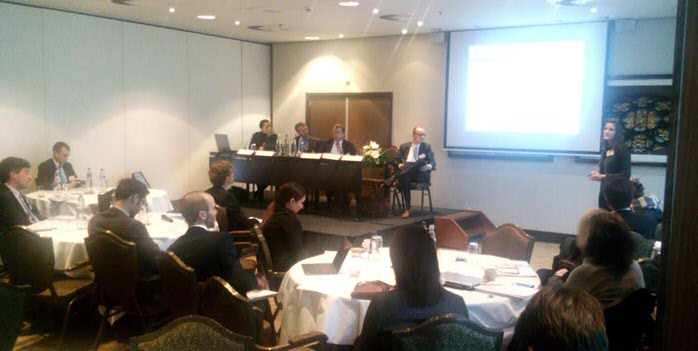Successful European Energy Law Seminar 2017
The 28th edition of the European Energy Law Seminar, organised by the Dutch Energy Law Association (NeVER) in co-operation with the Groningen Centre of Energy Law (GCEL) and the Scandinavian Institute of Maritime Law, took place in The Hague on 23 and 24 January. The Seminar was attended by almost 90 participants from all over Europe, the United States, and Pakistan.
Professor Roggenkamp of GCEL opened the seminar on Monday 23 January in her capacity as chairwoman of the NeVER. Topics addressed on the first day included developments in EU energy law, electricity market design, cross-border infrastructure, and energy network developments. The first day was concluded by a speech on Dutch-Norwegian energy relations by the Norwegian Ambassador to the Netherlands.
During the second day of the seminar presentations were given regarding the development renewable energy projects, reliability of energy supply, and the European gas market. In addition, parallel sessions were held on capacity mechanisms and prosumers. In the latter parallel session, Lea Diestelmeier and Dirk Kuiken – both PhD researchers at GCEL – gave a presentation on prosumer legislation in the Netherlands.

| Last modified: | 19 January 2024 11.27 a.m. |
More news
-
05 March 2025
Women in Science
The UG celebrates International Women’s Day with a special photo series: Women in Science.
-
04 February 2025
'To entice is okay, to mislead is not'
In the supermarket, there is a carton of ‘blackcurrant juice’. At least, that is what it is called and what the picture on the packaging suggests. The list of ingredients, however, states that the contents are mainly made of apples and grapes. Is...
-
23 January 2025
Two UG researchers join The Young Academy
Prof. Björn Hoops and Dr Esther Metting are joining The Young Academy (De Jonge Akademie, DJA) of the Royal Netherlands Academy of Arts and Sciences (Koningklijke Nederlandse Akademie van Wetenschappen, KNAW). Every year, the DJA selects 10 talented...
